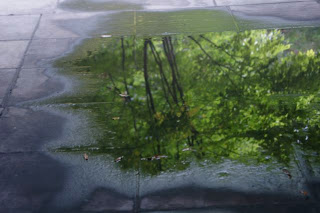 Sometimes when I come to this computer and choose a photograph and settle it into its place on this blog, I only know what mood I am in, not what "what" I have to say. That is the case this evening. It has been a slow Sunday, one that has left me feeling awkward in relationship to myself.
Sometimes when I come to this computer and choose a photograph and settle it into its place on this blog, I only know what mood I am in, not what "what" I have to say. That is the case this evening. It has been a slow Sunday, one that has left me feeling awkward in relationship to myself.
For example: At church this morning, a perfect stranger approached me suggesting that I must not get much sleep; it was the darkness beneath my eyes, she said, that gave my insomnia away. But. I wanted to say. But: I actually slept last night. Five hours, I wanted to say. Five. Whole. Hours. Logged. Last. Night. It occurred to me then how truly frightening I must be on most days, how I am the only one who does not see me.
In the absolute still of the afternoon, I pondered a revision to a novel. I asked myself, What do you have left? I did not yield (unto myself) a sufficient answer. Sometimes, it seems, I don't have all that much left.
Then, tonight, my student, K., sent in her final words about the class I've taught at Penn. Her words were so smart, they were so honest, they were so earned that I just read them through, and cried. K.'s words should make me happy, and in many ways they do. But they signal the end of something I have loved—those particular students, this particular year, our together journey of discovery—and there is no cure for that.
Viewing: Blog Posts Tagged with: English 145, Most Recent at Top [Help]
Results 1 - 10 of 10
Blog: Beth Kephart Books (Login to Add to MyJacketFlap)
JacketFlap tags: University of Pennsylvania advanced nonfiction, English 145, Add a tag
Blog: Beth Kephart Books (Login to Add to MyJacketFlap)
JacketFlap tags: University of Pennsylvania advanced nonfiction, English 145, Add a tag
 It rained yesterday, and the wet was in my socks and in my hair, it was the glance across my jacket, it was the chill in the room of Kelly Writers House, where my students had gathered to discuss their literary reportage projects. We got the heaters turned on to blast the chill away. We had peanut butter cookies to bolster our thinking. We measured how far each writer had come. We talked through the what next, the what now, the what still.
It rained yesterday, and the wet was in my socks and in my hair, it was the glance across my jacket, it was the chill in the room of Kelly Writers House, where my students had gathered to discuss their literary reportage projects. We got the heaters turned on to blast the chill away. We had peanut butter cookies to bolster our thinking. We measured how far each writer had come. We talked through the what next, the what now, the what still.
There is no perfect, I reminded them. There is only working toward good. Only studying structure and frame. Only vigilance against excess, presumption, assumption. Only remembering that it is in revision that we often find the heart of our story. Good writing takes time. Take that time, I insisted.
This week, the students will write their final pieces, reflections on "how their view of writing in general and of their own work in particular has been shaped, pummeled, reinforced, redirected, teased, or afflicted by English 145." I am interested, I have told them, " in how what you have read has shaped what you will likely read (and not read) moving forward. I am interested in how the work of your fellow students has broadened your idea of what writing can be. I am interested in where you think you will go next, as an emerging author."
They'll send me their papers. We'll celebrate with a final lunch. And then that will be it. My own, strange, wonderful journey with English 145.
Blog: Beth Kephart Books (Login to Add to MyJacketFlap)
JacketFlap tags: English 145, Add a tag
 We spent five minutes sitting together in morning silence before we threw my son's things into the back of the jeep and set off for the city, where the bus that would return him to his school hover-hummed. There is never enough time when my son is home. There is always, when he is near, tremendous calm. He hasn't an ounce of the self-trumpeting about him. No need to command the stage. I can't decide what I love most about him, but this is high on the list.
We spent five minutes sitting together in morning silence before we threw my son's things into the back of the jeep and set off for the city, where the bus that would return him to his school hover-hummed. There is never enough time when my son is home. There is always, when he is near, tremendous calm. He hasn't an ounce of the self-trumpeting about him. No need to command the stage. I can't decide what I love most about him, but this is high on the list.
I spent the day, then, thinking out loud with a friend about her dreams and, on either side of that, in the company of my students' last big papers. They have traveled so far, these writers. They have made room, in their minds and hearts, for a larger conversation about life and language, about this one word, vulnerability.
I may be very tired tonight. I may indeed be getting older. But look at the size and shape of my life. This is the feeling of fullness.
Blog: Beth Kephart Books (Login to Add to MyJacketFlap)
JacketFlap tags: University of Pennsylvania advanced nonfiction, English 145, Lititz, Add a tag
 And so in class, yesterday, we began to ask ourselves what teaching can deliver, what it is worth. What are the residuals of an advanced nonfiction workshop, for example? What will be carried forward, one short month from now, when we have had our last class and said our goodbyes (but not permanent goodbyes; that just won't do)? What will remain a decade hence, or two?
And so in class, yesterday, we began to ask ourselves what teaching can deliver, what it is worth. What are the residuals of an advanced nonfiction workshop, for example? What will be carried forward, one short month from now, when we have had our last class and said our goodbyes (but not permanent goodbyes; that just won't do)? What will remain a decade hence, or two?
I want my students leaving English 145 knowing more about how they think and why they think what they do. I want them hungry, always, to know more, precise in articulating their beliefs, willing to take incalculable risks and to start all over again. I want them daring and I want them alert and I want them, most of all, to know their own value, to never doubt it.
Can we teach that? Perhaps not. We can only give it room to grow.
Blog: Beth Kephart Books (Login to Add to MyJacketFlap)
JacketFlap tags: English 145, art of the interview, glass fox eyes, Add a tag
 Yesterday in English 145 we reviewed (among many other things) the mini-profiles the students had written about each other—small snatches cooked up from last week's interviews. It proved to be a session that went far beyond talk of technique and deep into the heart of many matters—compassion, accuracy, and the power of careful listening not least among them. Writing about another is no mere exercise, not just an opportunity to strut one's literary stuff. It is as well the commitment we must make to doing right by those of whom we ask our questions, those to whom we turn our thoughts.
Yesterday in English 145 we reviewed (among many other things) the mini-profiles the students had written about each other—small snatches cooked up from last week's interviews. It proved to be a session that went far beyond talk of technique and deep into the heart of many matters—compassion, accuracy, and the power of careful listening not least among them. Writing about another is no mere exercise, not just an opportunity to strut one's literary stuff. It is as well the commitment we must make to doing right by those of whom we ask our questions, those to whom we turn our thoughts.
Perhaps no one will ever see in us precisely what we believe is us. We require evidence, however, that the effort has been made.
Blog: Beth Kephart Books (Login to Add to MyJacketFlap)
JacketFlap tags: memoir, Gregory Djanikian, Jay Kirk, English 145, University of Pennsylvania, Locust Walk, writing workshops elephant's eye, Paxton Gate, Add a tag
 I arrived at the Penn campus early yesterday, first to have tea with Gregory Djanikian, a poet, a mentor, and the director of the creative writing staff. We talked of students and what might be yielded to them, talked of what remains, or should. We walked, then, to the eastern wedge of the campus, where Greg has a standing Monday squash game, and where I, by virtue of proximity to a once-familiar structure, remembered my own days on the varsity team.
I arrived at the Penn campus early yesterday, first to have tea with Gregory Djanikian, a poet, a mentor, and the director of the creative writing staff. We talked of students and what might be yielded to them, talked of what remains, or should. We walked, then, to the eastern wedge of the campus, where Greg has a standing Monday squash game, and where I, by virtue of proximity to a once-familiar structure, remembered my own days on the varsity team.
I said goodbye to Greg, then met Jay Kirk on the library steps. I had an elephant's eye for him—glass, a taxidermist's tool, an object found at Paxton Gate during a San Francisco trip. Up Locust Walk, then, Jay and I went, talking of books, rehearsing history, recalling the days, mine, when again and again my work was rejected for its lack of commercial viability. We talked about English 145, and about Jay's narrative nonfiction, and about what I hoped he might relate to the students of my class.
After lunch, Jay was there, in Room 209, engaging these young writers, as I knew he would, with stories about funeral home directors and brothels, a lesbian retirement community, Rwanda's post-genocide tourism business. In structure lies meaning, Jay told the class. Scene making is story making. Write your authentic self—your fears, your not knowing, your questions—directly onto the page.
They do. They have. For we critiqued the students' memoirs then—powerful, personal stories that demanded respect and received it. Talent matters in writing workshops, of course it does, but so do intellectual integrity and kindness. My students bring all three to class. They move me to tears. I can't help it.
Blog: Beth Kephart Books (Login to Add to MyJacketFlap)
JacketFlap tags: West Philadelphia, University of Pennsylvania, Locust Walk, English 145, Kelly Writers House, Add a tag
 I walk the campus every Monday before class—always a new direction, always some memory that I am stalking. Yesterday I went the length of Locust Walk and out toward West Philadelphia, where a mod-looking bowling alley has been slipped inside a residential street and the Dental School where I once worked has the face of new authority. At the corner of 42nd and Spruce I was besieged by memories of a friend with whom I shared a passion for Russian history. The room where he kept his books. The pea soup that he made from his mother's recipe. His fascination with Tolstoy.
I walk the campus every Monday before class—always a new direction, always some memory that I am stalking. Yesterday I went the length of Locust Walk and out toward West Philadelphia, where a mod-looking bowling alley has been slipped inside a residential street and the Dental School where I once worked has the face of new authority. At the corner of 42nd and Spruce I was besieged by memories of a friend with whom I shared a passion for Russian history. The room where he kept his books. The pea soup that he made from his mother's recipe. His fascination with Tolstoy.
By the time I reached the Writers House, I was feeling melancholy. J met me downstairs. S met me upstairs. K arrived with a tiny, days-old kitten tucked into the collar beneath her chin. "They call him Wild Bill," she told me, "and I think he likes my bling," for this found refugee from the streets of West Philly had dug his claw in deep to her necklace chain and was, it seemed, intent on staying.
The past is gone, except that it leans upon our present day, except that we write it into our stories, except that it tangles into our imaginations and hovers near. The past is a yearning, and now is the bowling alley, the cleaned-up Spruce, the Writers House, the stairs, the room, Wild Bill in K's collar, and the email that arrives from J, in the evening after class. It includes a bit of found memoir that, he says, he thinks I might like. It includes the line, "most unlonely teacher."
Yes. Certainly.
Blog: Beth Kephart Books (Login to Add to MyJacketFlap)
JacketFlap tags: Horace Kephart, James McPherson, Lore Kephart, English 145, America's Best Idea, Carolyn Forche, Presbyterian Children's Village, Add a tag
 I'll be speaking tonight at the Presbyterian Children's Village about the writer's life, and as I've been finalizing the talk this morning, I've been remembering a moment in Prague, 1995, when the poet Carolyn Forche shifted the tone and urgency of my writerly desires. I thought I'd share the opening paragraphs of the talk here today as well as the poem (previously published in the early days of this blog) that emerged in the wake of that experience.
I'll be speaking tonight at the Presbyterian Children's Village about the writer's life, and as I've been finalizing the talk this morning, I've been remembering a moment in Prague, 1995, when the poet Carolyn Forche shifted the tone and urgency of my writerly desires. I thought I'd share the opening paragraphs of the talk here today as well as the poem (previously published in the early days of this blog) that emerged in the wake of that experience.
Before I get to that, though, a few seemingly unrelated things. Last night's lectureship in honor of my mother was, in a word, extraordinary. As a family we had dinner with Dr. James McPherson; we learned and we laughed. Afterward we joined as many as 600 others to hear Dr. McPherson speak of Lincoln's emergence as a military strategist and leader. The night was rich; my father was happy. When we returned from the event, we caught the final moments of the Ken Burns film, "America's Best Idea," that featured my great-grandfather, Horace Kephart—the touching, panning image of the 6,000-plus-foot Great Smoky Mountains peak named in his honor. I am amazed by and grateful to all those who have visited this blog in the aftermath of the segment's screening.
Finally, the image featured in this post today is of my classroom, for English 145 at Penn. I found the students' most recent work in my in-box last evening after all the other glories. They continue to make the teaching exhilarating.
I’ve been writing for most of my life at this point — something I seem not to be able to stop myself from doing (though I’ve tried, believe me, I have). I passionately believe in the promise of stories, I am endlessly seduced by the choreography of language, I don’t go a day without trying to discover or de-puzzle a metaphor. Writing is not just about making a record, or making a claim, or leaving a mark. It is, to begin with, about seeing. It is what forces me to stop and wait, to look and speculate, to inquire and to propose. Writing makes time liquid. It makes of the vague dream a pulsed-through what if?
In the mid-1990s, after I’d published three dozen or so short stories and essays, but before I’d ever published a book, I had the privilege of traveling to Prague and seeing the poet Carolyn Forche read from her work in the dim light of a smoky bar. She was reading, among other things, about Terrence Des Pres, the great essayist and holocaust scholar who had recently died quiet tragically. She was reading, above all else, with conviction, and looking back, I recognize that it was her reading that night that most firmly settled in me the desire to craft work of enduring strength and meaning. This poem captures that shift in my own soul:
On Listening to Carolyn Forche Read Poetry in a Bar in Prague, 1995
Because in Prague I was nothing but wanting
with words and still recovering from new sin,
and because the bar was also dark and lamped
by the yellow of your hair, you made me believe
in the running for the heart of a poem,
the superceded shush between memory and maw.
Terrence, how the sand in the wind of your words
caught knots into my hair and chafed my skin.
It was how you riddled me almost
clean with possibility.
I was sitting with my son.
I was sitting beside my husband.
You were — may I use the word? — explicit.
more sensationally than it stands,
in the same way that a rescued love
is made more tender by its damage,
in the same way that women understand beauty
only in its passing, you in the bar in Prague
blew smoke up through the crevices of language.
Smoke the color of angel wings.
Poetry as salvation.
Blog: Beth Kephart Books (Login to Add to MyJacketFlap)
JacketFlap tags: University of Pennsylvania, English 145, the quad at the University of Pennsylvania, Add a tag
 We considered foreground and background in English 145 yesterday—the interplay of primary and secondary, the fringe of context, the depth that is gained by incrementally adjusting the writer-observer's depth of field. We took our cameras out and searched for the iconic, then asked ourselves what lay beyond the chosen subject, what defined the borderlands, how the borderlands in turn shadowed and shaped the subject.
We considered foreground and background in English 145 yesterday—the interplay of primary and secondary, the fringe of context, the depth that is gained by incrementally adjusting the writer-observer's depth of field. We took our cameras out and searched for the iconic, then asked ourselves what lay beyond the chosen subject, what defined the borderlands, how the borderlands in turn shadowed and shaped the subject.
For my part, I returned to the Quad at Penn—my home during a tumultuous freshman year, when the new was alarming, and the raw was very real, and I was saved by a sophomore downstairs who played Bruce Springsteen loud in his room. We were just friends, but friends mattered most. They are what now come into view when weather and mood return me to then.
Blog: Beth Kephart Books (Login to Add to MyJacketFlap)
JacketFlap tags: Michael Ondaatje, Running in the Family, English 145, synesthesia, Add a tag
 "My Grandmother died in the blue arms of a jacaranda tree. She could read thunder."
"My Grandmother died in the blue arms of a jacaranda tree. She could read thunder."
— Michael Ondaatje, Running in the Family
I read Running in the Family for the fourth time, in preparation for a class conversation on Monday. I come across the lines I remember loving and the lines that strike me as being brand new. This line here is an old favorite—the surprising synesthesia, the resurrection of the grandmother, the utterly indelible attributes. People are known for many things. We pile up our store of anecdotes. At the end of life, what will define you? What would it be to be the one memorialized by a gift for reading thunder?



I'm sorry that you're suffering from insomnia. Everything is harder without sleep.
Those who can sleep don't realize what a blessing it is. I can't believe a perfect stranger said something like that to you.
My sister is one of those dark-circley people...
Oh, such a beautiful post.